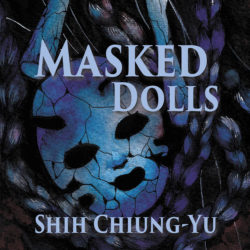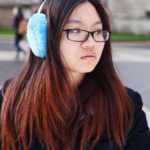Masked Dolls by Shih Chiung-Yu
 Translated by Wang Xinlin and Poppy Toland (Balestier Press, 2016)
Translated by Wang Xinlin and Poppy Toland (Balestier Press, 2016)
Publisher's Blurb
An Australian woman, burdened by the original sin of her Caucasian ancestors, and a Taiwanese woman, haunted by the memories of 100 years of conflict in her homeland, meet as backpackers while travelling in South Korea. As they live and travel together, two women in flight, one from the East and the other from the West, struggle to find a way out of their personal dilemmas.
Reading Chinese Network Reviews
 Masked Dolls consists of 23 chapters labelled as “conflicts”. Through these 23 conflicts, the author, Chiung-Yu Shih, weaves an epic story of personal and family tragedies caused by the invasion of the second Sino-Japanese War (1931-1945) and the western hegemony over China, Taiwan and Korea. The perspective of a young narrator leads the reader to trek through a “trail of tears” to see how those who were traumatized by the war survived but lead dysfunctional lives. The Sino-Japanese War finished in the last century, but its impact continues to shape the life of the young generation in the 21st century.
Masked Dolls consists of 23 chapters labelled as “conflicts”. Through these 23 conflicts, the author, Chiung-Yu Shih, weaves an epic story of personal and family tragedies caused by the invasion of the second Sino-Japanese War (1931-1945) and the western hegemony over China, Taiwan and Korea. The perspective of a young narrator leads the reader to trek through a “trail of tears” to see how those who were traumatized by the war survived but lead dysfunctional lives. The Sino-Japanese War finished in the last century, but its impact continues to shape the life of the young generation in the 21st century.
The story starts from the dawn of the new millennium when two women, Judy from Australia and Jiaying from Taiwan met each other in a Youth Hostel in Seoul. They immediately strike up a friendship upon discovering a commonality: both have just ended a relationship. Jiaying was intrigued by Judy’s former boy friend, Zhou, a Chinese student in Japan. Zhou would never forgive the atrocities committed by the Japanese military against his family and millions of innocent Chinese during Sino-Japanese War. He deliberately defiles the imperial shrine of Yasukuni by engaging in sexual intercourse there in revenge, a symbolic act to bring shame on the enemy. Having a western girl friend has boosted his self-esteem; to his mind, he has succeeded in conquering that ethnic group. It is something his ancestors failed to accomplish. However, despite being described as a caring lover by Judy, his tender love is often followed by physical and verbal abuse, which results in Judy fleeing to Korea.
Jiaying, the narrator of the story, centres her own story on her friends in the Creative Writing department, and on her unhappy family life. In her small circle of friends, Taomei, her lady friend, and Fat Luo, her male friend, are both very close to her. When failing to win Taomei's love, Fat Luo takes his revenge in his creative writing by writing Taomei as a loose woman. To be called a loose woman in a society that regards chastity highly is a punishment from hell. Having ruined Taomei, Fat Luo satisfies the public’s thirst for sensational news and wins his fame as the most talented writer in the island. It is a war between the sexes and the winner is the male who knows he can publicly shame the female by portraying her loose woman, a masked doll.
Back home, Jiaying’s family is another battlefield where father and mother are constantly fighting in the foreground while mother and daughter are fighting in the background. With a father as a guerrilla commander and an uncle acting as a spy in Korea during the war, the family has a series of tragedies they have to come to terms with. Torn by war, her mum has never been a caring and loving mother and the father was forever living in the shadow of the war. As described by Jiaying “the war had never finished. Every minute of it was relived fresh in my father’s memory.” (p. 201) The family constantly have to visit the higgledy-piggledy tombstones where the mother looks for her lost family members and her father looks for his lost wartime comrades.
Despite being survivors, the lives of the older generation are constantly haunted by the shadow of the war. With the passing of time, their sorrow only grows deeper and deeper till it buries them alive. A reflection from Jiaying’s uncle echoes the pain: “I cordoned myself off in loneliness, because there are indescribable moments in life that you just can’t face. The sorrow of life does not stop; it continues to fall on us all. “(p.238) No one survives the war intact: the older generation can only lead a dysfunctional life; the younger generation continue to bear the burden of the family tragedies into the 21st century. The war has ended in the last century, but its impact continues to affect its people over generations. A historian can record the war in detail, but it takes a good writer to touch on the hidden trauma and voice the poignant past before it disappears into the higgledy-piggledy tombstones.
Reviewed by Hsiu-chih Sheu
 This is not the book the back cover suggests it is, asking “Can humans exist without memories?” It is about memories, but rather looking at how we (as individuals and nations) remember past events and how they affect our present mindsets.
This is not the book the back cover suggests it is, asking “Can humans exist without memories?” It is about memories, but rather looking at how we (as individuals and nations) remember past events and how they affect our present mindsets.
Nor is this a book about an Australian woman (Judy) burdened by the sins (imperialism) of her English/French ancestors. In China, children are taught about past foreign aggression from infant school onwards. Are Westerners burdened by history, if even aware of the iniquities? Judy’s presence in the book, though significant, is small. We primarily see her through a relationship with her Chinese ex-boyfriend (Zhou); and as told to us by the book’s narrator – Jiaying, the Taiwanese woman. Remembering that Taiwan is, in the main, ethnically and culturally Chinese.
As for Jiaying, she also relays wartime memories of her father and uncle; but I’m not sure she is personally haunted by the memories of 100 years of conflict in China. The conflict refers to the period 1839 – 1953 (Opium Wars, Sino-Japanese Wars, China’s Civil War, Korean War). It seems more that the author, through Jiaying’s narration, is portraying the cumulative effect of these wars on the psyche of the Chinese nation and its people. Chinese sensitivity over these events, even today, should not be underestimated.
I felt the translation (by Wang Xinlin and Poppy Toland) was good, as I had to keep reminding myself it was originally written in Chinese; in my attempt to understand what the author wanted to say to a Chinese audience. Possibly the translation came about because there is an English-reading market that can appreciate the feminist angle of this novel. That this book works from different perspectives allows readers to draw a variety of conclusions.
As Westerners, we might think the author’s focus is attacking patriarchy. After all, we come across a number of particularly nasty men. They act barbarically, from positions of power, to address their feelings of humiliation. As a subject relevant to the present, and our own society, we are most likely to latch on to this aspect.
What about from a Chinese perspective? How might Chinese read the original work? Zhou would probably tell me (as he told Judy), “You’re a Westerner, you’ll never understand.” So out on a limb I go.
As ancestor worshippers, the Chinese are inextricably bonded to the past. This novel’s references to past imperialism are, for a Chinese reader, relevant today. The ‘foreign devils’ are still out there, and have already shown their true selves. The sufferings of ancestors (murdered and raped by imperialist forces) drives the narrative that weakness will result in being humiliated once again.
Yet where does the burden to honour wronged ancestors lead? How might a collective memory of humiliation, and perhaps an expectation to avenge it, manifest itself at an individual level? What good can it do to hold on to the pain of past injustices? In the end, does the author hint at forgiveness and moving on; whilst holding a pessimistic view that attachments to the past are too strong for this to happen? Or have I just confirmed Zhou’s view?
Barry Howard, 19/9/2017
 Shih Chiung-Yu tells a moving story through the eyes of the Taiwanese narrator, Jiaying. Jiaying’s narration takes us through the lives of those close to her, including that of someone she has most recently encountered, a Western girl named Judy whom she meets in a South Korean hostel. The reader meanders through the life experiences of these characters, the full impact of which is realised towards the end of the story. Jiaying observes those close to her in an apparently passive way, only later becoming aware of the affect these relationships have had on her own life, by which time she is powerless to act. The characters accumulate the weight of past decisions, which neither the passing of time nor an escape to new places can alleviate. Even the most carefree of personalities, which may spark admiration or even envy, have the potential to become victims of their own experiences.
Shih Chiung-Yu tells a moving story through the eyes of the Taiwanese narrator, Jiaying. Jiaying’s narration takes us through the lives of those close to her, including that of someone she has most recently encountered, a Western girl named Judy whom she meets in a South Korean hostel. The reader meanders through the life experiences of these characters, the full impact of which is realised towards the end of the story. Jiaying observes those close to her in an apparently passive way, only later becoming aware of the affect these relationships have had on her own life, by which time she is powerless to act. The characters accumulate the weight of past decisions, which neither the passing of time nor an escape to new places can alleviate. Even the most carefree of personalities, which may spark admiration or even envy, have the potential to become victims of their own experiences.
The story leads us to reflect on the meaning of nationhood and individuality. Jiaying’s father devoted his life to defending his nation. Not only is he faced with the confusion of having two homelands – one in Taiwan and one in Yunnan – but he is also devastated by the fact that his daughter has chosen to pursue a relationship with a western boyfriend and to move overseas. He is not the only person to question Jiaying’s decision about this matter. She is challenged by other Taiwanese men, who also believe that history is insurmountable, that nationality will always come before individuality, that people from other nations can ultimately not be trusted. They do not believe, unlike Jiaying, that an appreciation for individuals is borderless, just as an appreciation for art and music knows no geographical boundaries. Jiaying shares this view with Judy, the Western girl she meets in Seoul. Judy has a British mother, a French father and grew up in Australia. She does not have a sense of belonging to a particular country and sees herself as a free spirit, visiting Seoul after having lived in Tokyo with a Chinese boyfriend. Despite their convictions, both Judy and Jiaying have trouble understanding their foreign partners. The implication may be that intention alone is not sufficient to overcome the pull of a shared cultural identity, the roots of which may be more personal than is initially apparent.
Shih Chiung-Yu’s writing is enjoyable and easy to read, which can mislead us into assuming it is lacking in gravity. As the prose unravels we are weighed down by a heavy nostalgia, the thread of which runs throughout the story. The fact that this feeling lingers long after finishing the book may take us by surprise. Shih Chiung-Yu brings each character to life, leading the reader to feel intimately connected to them, regardless of whether they are likeable or not. We may have a niggling desire to pinpoint the mistakes the characters made in their lives. We feel as though they will each have a list of regrets, things they could have done differently were they to have been given better guidance or to have reflected more carefully upon their decisions. In the end, just as for the characters themselves, we will find it impossible to identify where they went wrong. ‘Masked Dolls,’ is a wonderful, haunting, novel.
Catherine Shipley, 14/9/2017
 Thanks to translators Wang Xinlin and Poppy Toland, the story of Taiwan as a fragile nation is now revealed to us. Like Judy in Shih Chiung-yu's 2002 novel Masked Dolls (Balestier Press, 2016), Western readers may wonder about their Chinese counterparts: “What was this constant need to carry the weight of the past, to obsess and agonise over it? Weren’t we living in the time of globalisation and the internet now?” The answer is given by Zhou in the book: “You’re a Westerner, you’ll never understand.” (p.104)
Thanks to translators Wang Xinlin and Poppy Toland, the story of Taiwan as a fragile nation is now revealed to us. Like Judy in Shih Chiung-yu's 2002 novel Masked Dolls (Balestier Press, 2016), Western readers may wonder about their Chinese counterparts: “What was this constant need to carry the weight of the past, to obsess and agonise over it? Weren’t we living in the time of globalisation and the internet now?” The answer is given by Zhou in the book: “You’re a Westerner, you’ll never understand.” (p.104)
Although Shih was born and raised in Taiwan, her father, like Jiaying’s father in the book, had served as deputy commander of Chinese guerilla troops battling against the Japanese along the Yunnan-Burmese border during the Second World War. Growing up among family members and relatives permanently scarred by war, Shih confesses in Jiaying’s voice: “As a child I’d listened to these stories with wide-eyed fascination. They felt like they belonged to some far off world – like Arabian Nights. He told them with little emotion or colour or any sense that they had really happened. They seemed more like the stories adults told to scare you, of childeating monsters lurking in the dark.” (p.107)
It is such childhood ambiguity – things happened but why are they relevant to me? – that has prompted many in Taiwan to question their identity in recent decades. The stories sound so remote and ancient that they are like myths, told by the older generations who are slowly and surely fading away yet still holding on to a distant land as home. In sharp contrast, the younger generations were born and raised in relative freedom and prosperity, having never witnessed war nor tasted bitterness or loss. To them, Taiwan is home. A democratic and independent home is crucial to their survival,
for this is all they have.
And these, old and young from a myriad of cultural and ethnic backgrounds, are the wretched and/or innocent dolls illustrated by Shih, their masks being lifted one by one, temporarily revealing their bewildered faces as they become submerged in the merciless tides that are the history of Taiwan and its relations to China and the world. Then, slowly, the masks resume their positions to cover up all the memories. All the truths and lies become myths, to be briefly cherished and then forgotten by future generations.
Christine Sun 11/9/2017
 Masked Dolls follows the lives of two females, both of whom are displaced and have chosen to spend time in Seoul, South Korea. The two protagonists meet through sharing a room at a youth hostel. As opposed to the chapters being called “Chapter” as most novels would, they are called “Conflict”. The reason for this becomes increasingly clear as you progress through this story.
Masked Dolls follows the lives of two females, both of whom are displaced and have chosen to spend time in Seoul, South Korea. The two protagonists meet through sharing a room at a youth hostel. As opposed to the chapters being called “Chapter” as most novels would, they are called “Conflict”. The reason for this becomes increasingly clear as you progress through this story.
As you turn to the very first page of the book, rather than finding a title page or a dedication page, you find instead a description of the two female protagonists giving readers a succinct and immensely useful background to who these characters are. This description is extremely useful for readers who aren’t, perhaps, knowledgeable of the social and historical context of South Korea, Taiwan, and China.
The novel itself flitters between present day and recollections of the past of the lives of these two women.
Following Judy, the younger of the two protagonists, readers are exposed to the abusive relationship she had with her boyfriend from Mainland China whom she met during her time studying in Tokyo as both were students studying at the same university there. After a rapid whirlwind romance the two began to live together and so begins their destructive relationship where readers are given few but clear depictions of traditional Chinese ideologies of male superiority and that women were perhaps resembled more like objects to be owned as opposed to human beings. The stories recounted by Judy about her relationship with him appears to emphasise the lack of rights she possessed in their relationship. As a female reader, as I read these passages I found myself filled with frustration and rage, partly because these situations are still taking place all around the world. The lack of inequality in a relationship between a man and a woman within some societies has been depicted, in my opinion, accurately. I think that more novels like these should be read to help expose the inequality that still exists so that we, in our modern day society, can work harder to resolve such an issue.
Another issue that is highlighted quite distinctly is the disdain towards mixed-race relationships felt by those with more traditional ideologies in China and Taiwan. This is portrayed by Jiaying’s own memories and the situations she encounter. With Judy, readers were exposed to the social issue of male dominance. With Jiaying, readers are exposed to more complex issues. The most evident one which jumped out at me was the anger towards the American forces and troops stationed in South Korea. The accounts of Jiaying’s memories of her uncle’s past and of her own personal encounters demonstrate the lingering resentment against foreign soldiers stationed in South Korea at the time.
The words of this novel evoke incredibly vivid imagery. At times I felt as though I was walking alongside Jiaying as her memories unfurled. This novel, in my opinion should be read by young adults and adults. There are scenes which are, without a doubt, too explicit and inappropriate for a child readership. For readers who are interested in understanding more about social issues that exist as a result of war and civil tensions, more specifically in relation to South Korea and Taiwan, I would highly recommend this book.
Bonnie Cheung 5/7/2017
